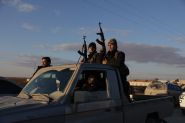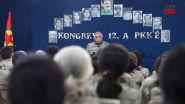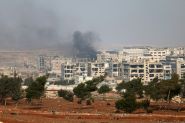- Home
- Middle East
- Kurds at a Crossroads as Middle East Shifts

Syrian Kurdish military leader Mazloum Abdi’s recent meeting with top Kurdish officials of northern Iraq points to the region’s shifting political landscape.
Syrian Democratic Forces (SDF) commander Mazloum Abdi’s November 19 trip to the autonomous Kurdistan region of northern Iraq was an important moment, underscoring that Kurdish leaders now appear to understand the importance of cooperation amid sweeping changes in the region.
Abdi—a close partner of the US military in Syria who spent years fighting ISIS—finds himself and the forces he commands at a crossroads. The SDF is expected to integrate into the reconstituting security forces of the new Syrian government. The SDF commander, who has not always seen eye-to-eye with the Kurdish leaders of northern Iraq, had a chance to meet with them during his trip to Dohuk to attend the Middle East and Security Forum’s (MEPS) 2025 conference.
During his trip, Abdi met with top officials in the Kurdistan Regional Government (KRG), including its president, Nechirvan Barzani, as well as political heavyweight and former president Masoud Barzani. Both are leaders of the Kurdistan Democratic Party (KDP), the largest Kurdish party in Iraq, which won over a million votes in Iraq’s November 11 parliamentary elections. In terms of regional politics, the Barzani family’s KDP and Abdi’s SDF are at opposite ends of the political spectrum. The KDP, which is a center-right party, has clashed with the leadership of Abdi’s SDF, which is drawn primarily from left-leaning People’s Protection Units (YPG) affiliated with the Kurdistan Workers Party (PKK).
Changes sweeping the region are reshaping Kurdish politics in Syria, Iraq, Turkey, and Iran. In early 2025, the PKK in Turkey said it would lay down its arms and end its nearly forty-year war against Ankara. Now the Turkish government is taking tentative steps toward peace. A Turkish parliamentary delegation met jailed PKK leader Abdullah Ocalan on November 24.
The peace initiative in Turkey affects northern Iraq. For years the PKK maintained bases in the mountainous Kurdish region of northern Iraq, prompting Turkish forces to invade northern Iraq and establish bases of their own to fight their foes. A low-level mountain war persisted for decades, with the ever-present potential to destabilize the KRG, which prefers stability and investment in northern Iraq.
The KDP has often had amicable ties with Turkey’s ruling Justice and Development Party (AKP). Because of these ties between the KRG and Ankara, the SDF has often been held at arm’s length by the Kurdish authorities in northern Iraq. This is because Ankara views the SDF as linked to its longtime foe PKK and therefore labels its leader Abdi as a “terrorist.”
Abdi’s appearance in Dohuk and his high-level meetings with the Barzanis reveal that the political landscape is shifting. With a peace process now in place with the PKK, Turkey is less concerned about the SDF in Syria. However, Ankara still wants the SDF to be folded into the new Syrian security forces, effectively disbanding it. Turkey’s objective to dismantle the SDF is not new. Turkey invaded the Kurdish-populated area of Afrin in 2018 and the SDF-held area of Serekaniya in 2019 during the first Trump administration, when it threatened to destroy the SDF. The SDF—which is made up of 80,000 fighters, many trained with US support—deterred Ankara from pursuing this goal.
Meanwhile, the PKK said in October that it had withdrawn from Turkey. A month later, it announced its troops in northern Iraq had moved away from the Turkish border. This key development makes a new era of peace in Syria, Iraq and Turkey possible. The ripple effects might be felt in Iran, where Kurdish dissident groups have maintained bases in northern Iraq. These changes go well beyond inter-Kurdish politics in the region.
History has shown that the Kurdish-populated areas of Turkey, Syria, Iraq and Iran act like a hinge between these four states and play a major role. Even though these Kurdish areas are landlocked and the Kurds have historically been oppressed by regimes such as those of the Assad family or Saddam Hussein, they have always been able to maintain influence in these four countries and play a key role in military and political affairs. For instance, during the war against ISIS that began in late 2013, the KRG successfully held off the terrorist group and defended Kirkuk as well. Meanwhile, the SDF was founded with the support of the US in 2015 to fight ISIS. By 2019 it had taken over a third of Syria and eliminated ISIS in the Euphrates River valley. ISIS still has scattered cells in Syria and Iraq, but its defeat was partly the result of Kurdish resolve on the front line.
The war on ISIS is now changing. The new Syrian government of Ahmad al-Sharaa has agreed to join the US-led Coalition against ISIS, which puts it on the same side as the SDF and the KRG’s Peshmerga forces in northern Iraq, offering opportunities for these security forces to work together. However, much work remains for the SDF to integrate into Syrian security forces, for the PKK peace process to advance, and for the KRG to sustain its development.
Read more




Comments